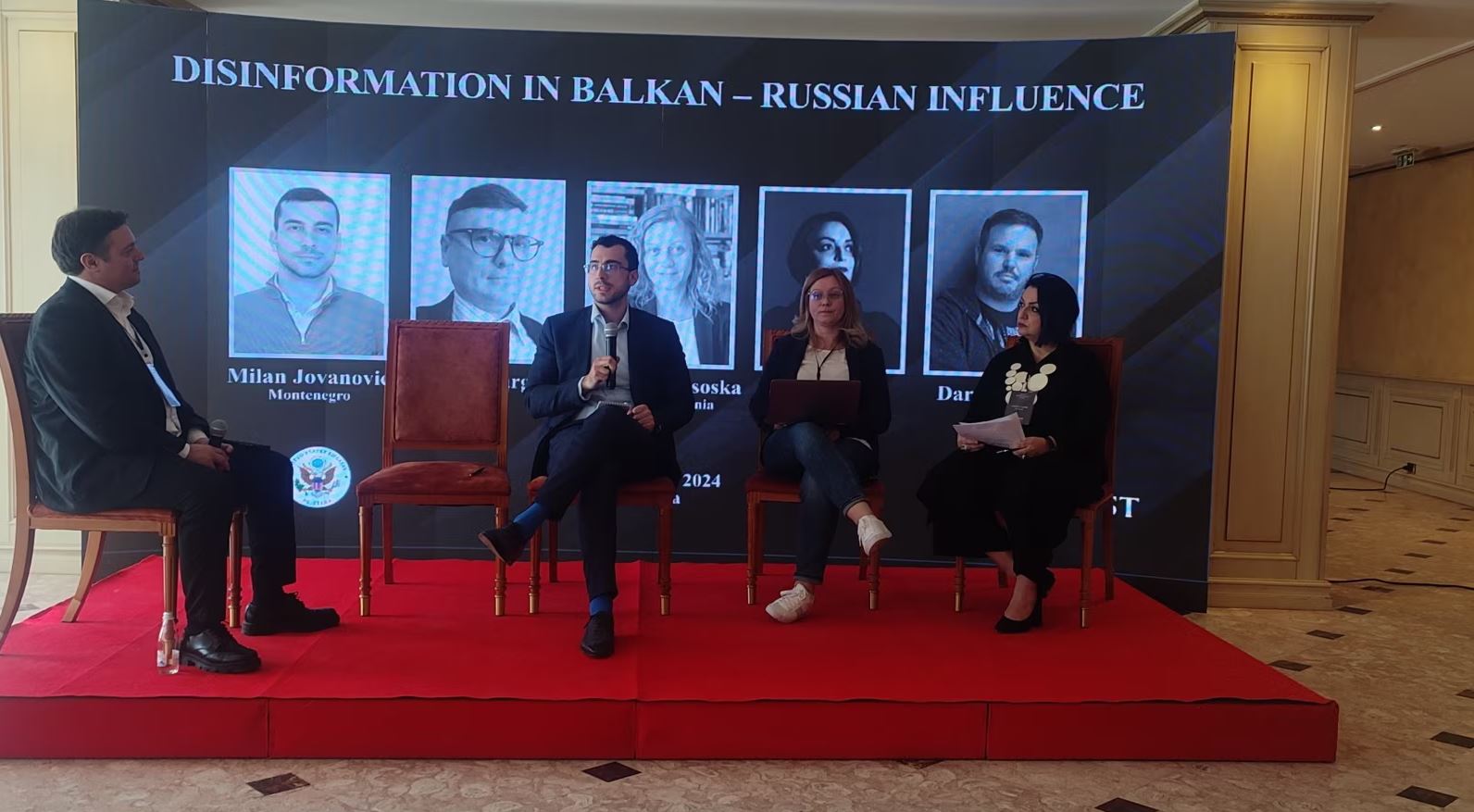Original article published on Euronews.al website
Russia spreads its propaganda in the countries of the Western Balkans through politicians, religious institutions, and media. That was the conclusion of the “Disinformation in Balkan” summit, held on February 22 in Pristina as part of the Balkan Summit on Disinformation. The organizer of this panel is the Kosovar portal “The Geopost”, which is engaged in the fight against disinformation and external influence.
There were no representatives from Kosovo on the panel, but participants from the region mentioned that a part of Russian propaganda refers to Serbia’s denial of Kosovo’s independence, declared in 2008. Besides Serbia and Bosnia and Herzegovina, other states in the region recognize Kosovo’s independence.
Boris Varga from Serbia, who is a journalist and publicist by profession, said that Russian propaganda was present in his country long before Russia’s invasion of Ukraine in 2022 and added that almost every regime supported it.
“Hybrid warfare is not only against Ukraine but also against the West. The Western Balkans region is an ideal zone to cause instability in the EU’s neighborhood,” he said.
He said that Serbia has not imposed any sanctions against Russia and that Moscow’s propaganda is spreading freely at all levels of society.
“Belgrade uses pro-Russian propaganda for its own needs while sitting on two chairs. This is how Serbia is expanding its influence in Republika Srpska [the Serb entity in Bosnia and Herzegovina] and Montenegro,” he said.
Serbia did not join the sanctions imposed by Western countries against Russia because of the invasion of Ukraine, and Serbian President Aleksandar Vučić reiterated that he will try to maintain this stance. On the other hand, Serbia supported a United Nations resolution condemning Russia’s invasion of Ukraine, while Belgrade explained the non-imposition of sanctions against Moscow with traditional Serbian-Russian ties and economic interests.
Millan Jovanović from Montenegro, an expert in transatlantic security focusing on disinformation and foreign influence, stated that Russia, despite sanctions, freely spreads its propaganda at various levels, mainly through political actors and the Serbian Orthodox Church.
He also emphasized that pro-Russian media are available to the general public in the region’s countries, as well as Kremlin-backed Russian media such as Russia Today and Sputnik.
“We have similar things in the region that are interconnected; there is a sentiment against Western countries, while the pro-Russian sentiment is protected. A higher level of citizen education is necessary to prevent the spread of disinformation,” he said.
Jovanović added that there is also a large media network through which the propaganda of the “Orthodox brothers” is spread, suggesting that Ukrainians are no different from Russians.
Darko Brkan, a civil society activist from Bosnia and Herzegovina, highlighted similar issues. He stated that Russia exerts its greatest influence in Bosnia and Herzegovina through one of the entities, namely through Republika Srpska.
He added that disinformation is mostly spread in coordination with the media from Serbia.
Western countries and the European Union have made it clear to the President of Republika Srpska, Milorad Dodik, several times that maintaining close ties with Russia and Belarus is not in line with the state’s path toward European integration.
Dodik, who is under sanctions from the United States and the European Union, has stated that Republika Srpska refuses to join sanctions against Russia despite, as he said, daily pressures.
Rosana Aleksoska from North Macedonia, engaged in the fight against fake news, said during the that Russia has a significant influence, and it is extremely important to talk about it whenever possible.
“It must be understood that individuals believe lies from Russia, which spreads propaganda… The less we understand what is happening in Ukraine, the greater the influence of disinformation,” she assessed.
Gerta Zaimi from Albania, involved in Balkan politics, emphasized that Russia conducts a different kind of propaganda in her country compared to the former Yugoslav states, thus trying to influence the cessation of contacts with Western countries.
Earlier, at the Balkan summit on disinformation, there was a panel on disinformation in Europe, where a researcher from Estonia, Vladimir Sazonov, said that Russian propaganda targets European and Western policies.
“Russia has a tradition of propaganda, influence on identity since the imperialist era, and it does not stop. It will not stop,” he said.
On February 21, the EU approved the thirteenth package of sanctions against Russia. With the expansion of restrictive measures, the list of sanctioned individuals supporting Russia’s war against Ukraine now numbers over 2,000.
The final decision will be published in the official EU gazette on the eve of the second anniversary of the start of the war in Ukraine, which began on February 24, 2022.



